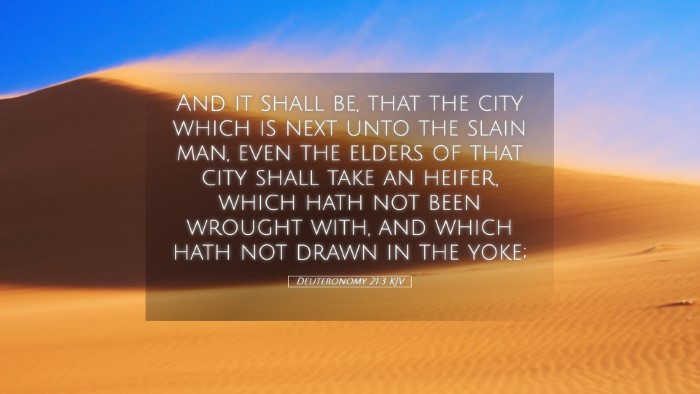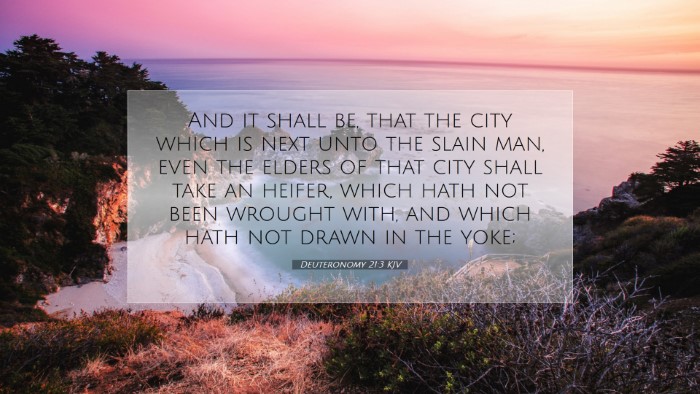Commentary on Deuteronomy 21:3
The verse states: "And it shall be, that the city which is too far from thee, which thou shalt choose to put the people to death, even the elders of that city shall come forth, and the elders of that city shall take a heifer, which hath not been wrought with, and which hath not drawn in the yoke." (Deut 21:3 KJV)
Contextual Analysis
This verse is part of a larger section that deals with procedures related to unsolved murders and city elders' responsibilities. The significance of the “heifer” as a sin offering is emphasized, highlighting the seriousness of atonement.
Theological Implications
- Nature of Atonement: The heifer symbolizes innocence and purity, thereby illustrating the idea of blood as a means of atonement (Henry). This underscores the concept that the shedding of innocent blood can remit the responsibility of guilt from the community.
- Community Responsibility: The actions of the elders show that the community is accountable for the moral breaches that occur within its bounds, reflecting a collectivist understanding of righteousness (Barnes).
- God’s Justice: Engaging a heifer signifies not only the weight of sin but also the necessity of God’s justice in addressing grievances in the land (Clarke). This reflects the larger narrative of seeking justice and mercy within the Hebraic tradition.
Insights from Commentators
Matthew Henry
Henry emphasizes the importance of the elders' role in mediating justice. They are seen as wise guides whose responsibility it is to seek truth and uphold righteousness within their locality. He also discusses the necessity of conducting such acts with reverence, noting that even the act of offering a heifer should be performed with humility and sincerity before God.
Albert Barnes
Barnes provides a detailed commentary on the socio-legal implications of the verse. He notes that the elders are tasked with validating the actions of the community and acting on behalf of the populace before God. Barnes urges that this practice serves to unify the community and reinforces the need for collective moral accountability.
Adam Clarke
Clarke brings forth a fascinating observation regarding the selection of the heifer. He points out that this process was not arbitrary but rather had specific spiritual and symbolic meanings. The heifer must be free from work, which serves as a metaphor for Christ's innocence and the unblemished nature of the sacrifice required for atoning sin.
The Rabbinical Perspective
In Jewish tradition, this ritual of the heifer is significant. It serves not only as a means of atonement but is also understood as a call for introspection concerning communal sin. The Talmudic interpretations highlight that every individual shares in the sacrifice, which reminds the community of their interconnectedness in moral standing.
Applications for Today
- Community Accountability: This passage underscores the necessity for community engagement in moral and spiritual decisions, serving as a potent reminder for local churches to take responsibility for their members' spiritual welfare.
- Atonement and Forgiveness: The heifer exemplifies the need for atonement in our relationships. Modern believers can learn the importance of seeking forgiveness and reconciling disputes through sincere confession and repentance.
- Social Justice: The call to justice found in this text can motivate modern believers to advocate for social justice, echoing the biblical principle that each life is valuable and should be revered.
Conclusion
Deuteronomy 21:3 reveals profound truths regarding community involvement in moral matters, the importance of atonement, and the collective responsibility for sin. As pastors, students, and theologians delve into this text, they are encouraged to reflect on how these ancient practices and concepts translate into modern faith practices, emphasizing the continuing relevance of Scripture in our lives.


